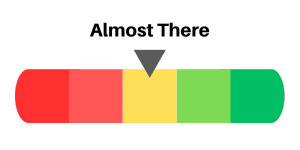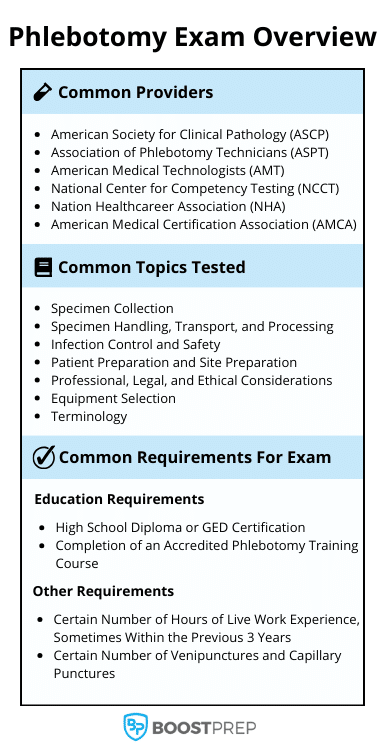Take our phlebotomy practice test below to test your knowledge. You will find 30 questions that test you on various phlebotomy topics.
Instantly find out if you are ready for your phlebotomy exam!
Phlebotomy Diagnostic Pretest
Exam Summary
0 of 30 Questions completed
Questions:
Information
You have already completed the exam before. Hence you can not start it again.
Exam is loading…
You must sign in or sign up to start the exam.
You must first complete the following:
Results
Results
Time has elapsed
You have reached 0 of 0 point(s), (0)
Earned Point(s): 0 of 0, (0)
0 Essay(s) Pending (Possible Point(s): 0)
Categories
- Phlebotomy Equipment Selection 0%
- Phlebotomy Infection Control and Safety 0%
- Phlebotomy Patient Preparation and Site Preparation 0%
- Phlebotomy Professional, Legal, and Ethical Considerations 0%
- Phlebotomy Specimen Collection 0%
- Phlebotomy Specimen Handling, Transport, and Processing 0%
- Phlebotomy Terminology 0%
-
Keep Studying: You will not pass the Phlebotomy exam right now. You need to continue studying for the exam. Take some of our full-length practice exams.
-
Almost There: We recommend that you keep studying. You may be able to pass the Phlebotomy exam right now, but it will be close. Take some of our full-length practice exams.
-
You Are Ready: We feel you are ready for the Phlebotomy exam. You can continue to study if you would like to be safe. Take some of our full-length practice exams.
- 1
- 2
- 3
- 4
- 5
- 6
- 7
- 8
- 9
- 10
- 11
- 12
- 13
- 14
- 15
- 16
- 17
- 18
- 19
- 20
- 21
- 22
- 23
- 24
- 25
- 26
- 27
- 28
- 29
- 30
- Current
- Review
- Answered
- Correct
- Incorrect
-
Question 1 of 30
1. Question
How long should the phlebotomist allow the tourniquet to stay on the patient?
CorrectIncorrect -
Question 2 of 30
2. Question
Which patients are NOT suitable for capillary sampling?
CorrectIncorrect -
Question 3 of 30
3. Question
What must the phlebotomist do when performing a capillary blood collection for glucose testing?
CorrectIncorrect -
Question 4 of 30
4. Question
When must the phlebotomist ensure the centrifugation of an anticoagulated specimen?
CorrectIncorrect -
Question 5 of 30
5. Question
Which action would a phlebotomist NOT take if a serum tube fails to completely separate the cells from the serum?
CorrectIncorrect -
Question 6 of 30
6. Question
How are frozen specimens transported to the laboratory?
CorrectIncorrect -
Question 7 of 30
7. Question
When must a phlebotomist replace and dispose of sharps containers?
CorrectIncorrect -
Question 8 of 30
8. Question
Which is a common hospital-acquired infection?
CorrectIncorrect -
Question 9 of 30
9. Question
Which class of fire extinguisher must a phlebotomist use to put out a fire on the patient’s bed?
CorrectIncorrect -
Question 10 of 30
10. Question
How long must the phlebotomist cleanse the site of the intended venipuncture?
CorrectIncorrect -
Question 11 of 30
11. Question
What is the appropriate action of a phlebotomist who enters a patient’s room with visitors?
CorrectIncorrect -
Question 12 of 30
12. Question
How can the phlebotomist promote comfort to a patient with hairy arms when applying a tourniquet?
CorrectIncorrect -
Question 13 of 30
13. Question
What type of consent does an unconscious patient provide during an emergency?
CorrectIncorrect -
Question 14 of 30
14. Question
Who provides an infant’s consent for a blood collection procedure?
CorrectIncorrect -
Question 15 of 30
15. Question
What is the correct action of a phlebotomist if a patient’s family or friend demands the patient’s test results?
CorrectIncorrect -
Question 16 of 30
16. Question
Which tubes should a phlebotomist collect when a patient arrives at the laboratory for BUN, CBC, and glucose testing?
CorrectIncorrect -
Question 17 of 30
17. Question
Which type of disinfectant must the phlebotomist avoid when cleansing the top of a blood culture bottle?
CorrectIncorrect -
Question 18 of 30
18. Question
Which is the ratio of total blood cell volume to the total blood volume and expressed as a percentage?
CorrectIncorrect -
Question 19 of 30
19. Question
How long must the patient leave the bandage on the collection site?
CorrectIncorrect -
Question 20 of 30
20. Question
Where must a phlebotomist perform venipuncture if the patient has an arteriovenous (AV) fistula?
CorrectIncorrect -
Question 21 of 30
21. Question
Why must a phlebotomist perform a two-point check after venipuncture?
CorrectIncorrect -
Question 22 of 30
22. Question
Which of the following is NOT a requirement for specimen labels?
CorrectIncorrect -
Question 23 of 30
23. Question
When must the phlebotomist transfer the specimen into a vacutainer tube when using the syringe method for collection?
CorrectIncorrect -
Question 24 of 30
24. Question
Which of the laboratory tests do NOT require chilling?
CorrectIncorrect -
Question 25 of 30
25. Question
What is an example of a phlebotomist practicing an appropriate aseptic technique?
CorrectIncorrect -
Question 26 of 30
26. Question
What must the phlebotomist perform first if accidentally stuck by a needle?
CorrectIncorrect -
Question 27 of 30
27. Question
Which level of infection control does the phlebotomist perform when cleansing the site of venipuncture?
CorrectIncorrect -
Question 28 of 30
28. Question
How should a phlebotomist NOT ask a patient for identification?
CorrectIncorrect -
Question 29 of 30
29. Question
Which vessel pulsates, has more elasticity, and a thick wall?
CorrectIncorrect -
Question 30 of 30
30. Question
What type of consent does the patient provide when extending their arm toward the phlebotomist after discussing the purpose of the procedure?
CorrectIncorrect
Unlock Our Phlebotomy Prep Course. Pass Guarantee.
Prep with peace of mind with our 100% pass guarantee. Starting at $27.99.
Phlebotomy Exam Overview
The phlebotomy certification exam varies as there are many different providers out there that offer certification. You will need to check with your specific state to see which provider you should be using for certification.
Here are some of the bigger providers for phlebotomy certification:
- American Society for Clinical Pathology (ASCP)
- Association of Phlebotomy Technicians (ASPT)
- American Medical Technologists (AMT)
- National Center for Competency Testing (NCCT)
- National Healthcareer Association (NHA)
- American Medical Certification Association (AMCA)
Topics Tested
All the exams test very similar topics and concepts, but the requirements to take the exam, the number of questions, and time limits are slightly different.
You can expect questions on the following topics:
- Specimen Collection
- Specimen Handling, Transport, and Processing
- Infection Control and Safety
- Patient Preparation and Site Preparation
- Professional, Legal, and Ethical Considerations
- Equipment Selection
- Terminology
Phlebotomy Practice Question Types
One of the best ways to prepare for your certification exam is by taking a free phlebotomy practice test. Our exam above is a great way to start. You will 7 different types of questions on our exam (broken down by topics):
- Specimen Collection: the process of obtaining blood or other bodily fluids from a patient for diagnostic or therapeutic purposes.
- Specimen Handling, Transport, and Processing: Involve accurately labeling, securely packaging, and appropriately processing blood or bodily fluid samples to maintain integrity and ensure reliable laboratory test results.
- Infection Control and Safety: Measures to prevent the transmission of infections, ensuring aseptic techniques during blood collection, and maintaining a safe environment for both patients and healthcare providers.
- Patient Preparation and Site Preparation: Involves educating patients about the procedure, obtaining informed consent, and ensuring their comfort, while site preparation includes identifying and cleaning the appropriate venipuncture site using antiseptic techniques to minimize the risk of infection.
- Professional, Legal, and Ethical Considerations: Following industry standards, maintaining patient confidentiality, obtaining informed consent, and ensuring accurate documentation of procedures to uphold patient rights and professional integrity.
- Equipment Selection: Involves choosing appropriate tools such as needles, collection tubes, tourniquets, and alcohol wipes based on patient needs, safety considerations, and the type of specimen required for accurate diagnostic testing.
- Terminology: Familiarizing yourself with the specialized vocabulary and language used to describe procedures, equipment, and tests related to blood collection and analysis.
Practice for Your Phlebotomy Exam with the Right Tools
When preparing for your exam, make sure you are using the right tools. We recommend a couple of different tools, which you can learn more about below.
1. Practice Exams
A phlebotomy practice exam is one of the best ways to prepare. You will be exposed to the concepts, types of questions, and format of the exam before you take the actual exam.
The best practice exams will include detailed answer explanations (like ours). You can learn a ton from these answer explanations, and we encourage our users to spend some time reviewing the explanations after taking each exam.
Practice exams will also help you get a feel for the timing aspect of the exam, which will help you finish your actual exam in time on test day.
2. Cheat Sheets
You may have taken an accredited certification course already but want to brush up on some items before taking the certification exam. This is where we come in! We offer cheat sheets to help you quickly brush up on key concepts you will need to know.
Our cheat sheets are to-the-point and only include the most important information. They will help you study in an efficient manner and not waste any of your time.
3. Flashcards
Flashcards are another great way to prepare for your exam. Just like our cheat sheets, flashcards will help you learn key concepts in an efficient manner. We offer 450+ flashcards for you to study from. You can review each flashcard or study by briefly skimming over the entire set.
Tips and Tricks for Phlebotomy Practice
The phlebotomy exam can be overwhelming at times. We compiled some key tips and tricks that you should keep in mind when practicing for the exam.
- Take a Baseline Phlebotomy Practice Exam: We recommend taking our baseline exam above to see where you stand. You may do very well and not need any additional help. You may not do very well and realize you need some help.
- Read Answer Explanations: Answer explanations are one of the best ways to learn new material and brush up on old material. You will learn why an answer was correct or incorrect. You will also learn new material that you may not have already known.
- Pay Attention to Specific Categories: Our practice exams break the questions down into specific categories. You may find that you really struggle with specimen collection problems. If this is the case, you can focus your studies on that specific topic. Paying attention to specific categories will help you study more efficiently.
Frequently Asked Questions
The type of certification you take depends on different factors. Two of the main factors include the state you live in your employer. It is important to check with your state requirements and your employer before registering for an exam.
The length varies depending on which certification exam you take. However, most of them last between 2 hours and 3 hours.
The number of questions varies depending on which certification exam you take. However, most exams have between 100 and 200 questions.
All the certification providers name their topics differently, but they all test very similar concepts. You can expect to be tested on the following topics:
- Specimen Collection
- Specimen Handling, Transport, and Processing
- Infection Control and Safety
- Patient Preparation and Site Preparation
- Professional, Legal, and Ethical Considerations
- Equipment Selection
- Terminology
You will be able to retake the exam. However, the retake restrictions vary by provider.



